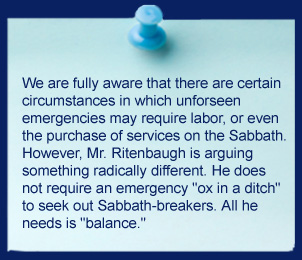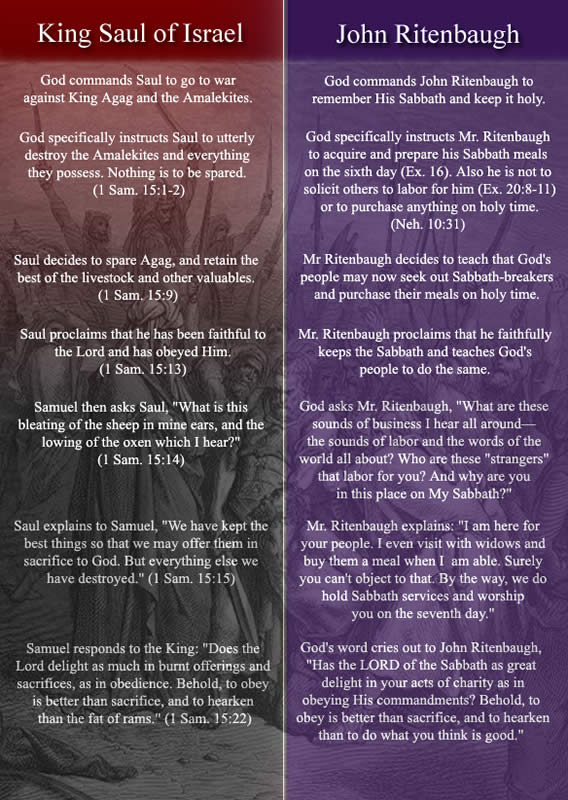

Rehabilitating Evil


Whosoever therefore shall break one of these least commandments,
and shall teach men so, he shall be called the least in the kingdom of heaven:
but whosoever shall do and teach them, the same shall be called
great in the kingdom of heaven.
Matthew 5:19
When defending the practice of dining out on the Sabbath, John Ritenbaugh employs what is arguably one of the greatest insults to God's law in his quiver of points. This COG leader contends that seeking out unbelievers, who desecrate what God made holy, can actually be a way to show honor to the poor and less fortunate. Here is how he advances this argument.
John Ritenbaugh:
"The Sabbath, and going out to a restaurant, can present an opportunity to go out with a widow, or maybe with a family that does not have much cash jingling around in their pockets. It would be something that maybe we would not be able to have the opportunity to do without making a real long trip somewhere, because we live pretty well scattered out."
Our Response:
What Mr. Ritenbaugh is employing is human reasoning at its very worst. He concludes that if an act of charity can be integrated into an act of disobedience it nullifies the disobedience. Sadly, this line of thinking does not reflect God's word, nor does it express His wisdom. Instead, it is a desperate attempt to make something God hates look like something He loves. To suggest that God will turn a blind eye to sin if His people simply perform an act of kindness during the sin is reminiscent of the selling of indulgences by the Catholic Church.
Note from Blow the Trumpet

The Bible declares that God takes no pleasure in sin (Psa. 5:4) and this holds true for the sins of others. Mr. Ritenbaugh, on the other hand, not only embraces the sin, but asserts that partaking of its fruit advances the cause of Christian charity.
This approach is cynical to the core and is exactly what Protestants employ when defending such pagan customs as Christmas and Easter. Sadly, Mr. Ritenbaugh applies the identical mindset when justifying the practice of God's people seeking out unbelievers and paying them for their Sabbath labor.
John Ritenbaugh is not the first person to justify sin by cloaking it in an act of righteousness. King Saul of Israel did the same thing when rationalizing his failure to follow God's instruction concerning how to prosecute a war with King Agag and the Amalekites. Consider the similarities between what Saul did three thousand years ago and what John Ritenbaugh advocates today.
Justifying Sin

A Crushing Pronouncement
As Samuel prepared to leave Saul he issued a final observation concerning what the King had done and the consequences he would have to suffer for his disobedience. Notice what Samuel says.
For rebellion is as the sin of witchcraft, and stubbornness is as iniquity and idolatry. Because you have rejected the word of the Lord, He has also rejected you from being king. (1Sam. 15:23)
In these thirty-two words, judgment was pronounced on the first king of Israel. All that Saul had been given was going to be stripped from him because of his own pride and arrogance. Because Saul thought he had a better way of doing things than the God who made him, his throne was going to be given over to someone who understood that Israel belonged to God, not to a king.
We at Blow the Trumpet believe Mr. Ritenbaugh should prayerfully consider that although the Sabbath was made for man (Mk. 2:27), it is God's Sabbath and Jesus is its Lord (vs 28). This fact alone should inspire him to take serious pause before attempting to make some slight modifications to God's instructions regarding holy time. King Saul thought he could make some slight adjustments to God's word as well, and we all know how that turned out.
A Final Thought
As God's people consider the issue that is set before them, it is important to understand that the Almighty's position concerning profane labor on the Sabbath has never changed (Mal. 3:6, Heb. 13:8). He was opposed to it at the beginning and He remains opposed to it to this very day. Nothing more graphically illustrates the strength of God's view on this issue than what was expressed in His own law, which was introduced to ancient Israel after they were delivered out of bondage in Egypt.
When the Holy One of Israel first presented His great moral code to these emancipated slaves, it was His intent that no one would labor on the Sabbath (Ex. 20:8-11) with the exception of those He specifically designated (Levites in His service). To do so was a capital crime (Ex.31:14). Furthermore, He made no provisions for His people to avail themselves of the labor of unbelievers on His Sabbath. This included unbelievers both within the camp and outside the camp. Those inside the camp were bound by the same Sabbath law as the Israelites. And those outside the camp were declared off limits to God's people on the Sabbath. Simply because these unbelievers now saturate our society does not mean God now permits His people to seek them out and purchase their goods. This is NOT how He thinks. Mr. Ritenbaugh may believe that our culture changes everything, but your Bible says otherwise. There is not a hint in God's word that suggests that what was once Sabbath breaking is now Sabbath keeping.
Finally, when God's Millennial Kingdom is established on earth, under the leadership of Jesus Christ and His saints, no one will be engaging in labor on His Sabbath. That includes the labor involved in running a restaurant. Why? Because God's great moral law forbids it. And in the Kingdom all will obey His law (Isa. 66:23). Today God's people have the distinct privilege of serving under that law. Mr. Ritenbaugh may teach that we may take our lead from the world and its culture, however, as for us we will fear the Lord (Deut. 6:24-25).
 Print
Print